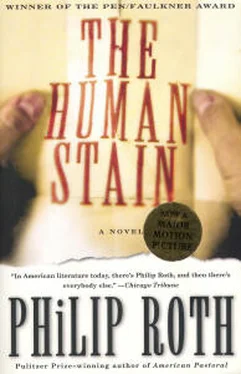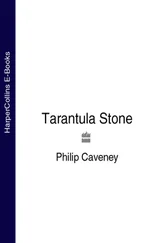“Never fished again.”
“Almost never. True. Virtually never. As good as never. Hear these songs?” The four radios were playing in the house, and so even out on the road it would have been impossible not to hear them. “After the war, those were the songs,” he said. “Four, five years of the songs, the girls, and that fulfilled my every ideal. I found a letter today. Cleaning out that Spooks stuff, found a letter from one of the girls. The girl. After I got my first appointment, out on Long Island, out at Adelphi, and Iris was pregnant with Jeff, this letter arrived. A girl nearly six feet tall. Iris was a big girl too. But not big like Steena. Iris was substantial. Steena was something else. Steena sent me this letter in 1954 and it turned up today while I was shoveling out the files.”
From the back pocket of his shorts, Coleman pulled the original envelope holding Steena's letter. He was still without a T-shirt, which now that we were out of the kitchen and on the porch I couldn't help but take note of — it was a warm July night, but not that warm. He had never struck me before as a man whose considerable vanity extended also to his anatomy. But now there seemed to me to be something more than a mere at-homeness expressed in this exhibition of his body's suntanned surface. On display were the shoulders, arms, and chest of a smallish man still trim and attractive, a belly no longer flat, to be sure, but nothing that had gotten seriously out of hand — altogether the physique of someone who would seem to have been a cunning and wily competitor at sports rather than an overpowering one. And all this had previously been concealed from me, because he was always shirted and also because of his having been so drastically consumed by his rage.
Also previously concealed was the small, Popeye-ish, blue tattoo situated at the top of his right arm, just at the shoulder joining — the words “U.S. Navy” inscribed between the hooklike arms of a shadowy little anchor and running along the hypotenuse of the deltoid muscle. A tiny symbol, if one were needed, of all the million circumstances of the other fellow's life, of that blizzard of details that constitute the confusion of a human biography — a tiny symbol to remind me why our understanding of people must always be at best slightly wrong.
“Kept it? The letter? Still got it?” I said. “Must've been some letter.”
“A killing letter. Something had happened to me that I hadn't understood until that letter. I was married, responsibly employed, we were going to have a child, and yet I hadn't understood that the Steenas were over. Got this letter and I realized that the serious things had really begun, the serious life dedicated to serious things. My father owned a saloon off Grove Street in East Orange. You're a Weequahic boy, you don't know East Orange. It was the poor end of town. He was one of those Jewish saloon keepers, they were all over Jersey and, of course, they all had ties to the Reinfelds and to the Mob — they had to have, to survive the Mob. My father wasn't a roughneck but he was rough enough, and he wanted better for me. He dropped dead my last year of high school. I was the only child. The adored one. He wouldn't even let me work in his place when the types there began to entertain me. Everything in life, including the saloon— beginning with the saloon — was always pushing me to be a serious student, and, back in those days, studying my high school Latin, taking advanced Latin, taking Greek, which was still part of the old-fashioned curriculum, the saloon keeper's kid couldn't have tried harder to be any more serious.”
There was some quick by-play between us and Coleman laid down his cards to show me his winning hand. As I started to deal, he resumed the story. I'd never heard it before. I'd never heard anything before other than how he'd come by his hatred for the college.
“Well,” he said, “once I'd fulfilled my father's dream and become an ultra-respectable college professor, I thought, as my father did, that the serious life would now never end. That it could never end once you had the credentials. But it ended, Nathan. ‘Or are they spooks?’ and I'm out on my ass. When Roberts was here he liked to tell people that my success as a dean flowed from learning my manners in a saloon. President Roberts with his upper-class pedigree liked that he had this barroom brawler parked just across the hall from him. In front of the old guard particularly, Roberts pretended to enjoy me for my background, though, as we know, Gentiles actually hate those stories about the Jews and their remarkable rise from the slums. Yes, there was a certain amount of mockery in Pierce Roberts, and even then, yes, when I think about it, starting even then ...” But here he reined himself in. Wouldn't go on with it. He was finished with the derangement of being the monarch deposed. The grievance that will never die is hereby declared dead.
Back to Steena. Remembering Steena helps enormously.
“Met her in '48,” he said. “I was twenty-two, on the GI Bill at NYU, the navy behind me, and she was eighteen and only a few months in New York. Had some kind of job there and was going to college, too, but at night. Independent girl from Minnesota. Sure-of-herself girl, or seemed so. Danish on one side, Icelandic on the other. Quick. Smart. Pretty. Tall. Marvelously tall. That statuesque recumbency. Never forgotten it. With her for two years. Used to call her Voluptas. Psyche's daughter. The personification to the Romans of sensual pleasure.”
Now he put down his cards, picked up the envelope from where he'd dropped it beside the discard pile, and pulled out the letter. A typewritten letter a couple of pages long. “We'd run into each other. I was in from Adelphi, in the city for the day, and there was Steena, about twenty-four, twenty-five by then. We stopped and spoke, and I told her my wife was pregnant, and she told me what she was doing, and then we kissed goodbye, and that was it. About a week later this letter came to me care of the college. It's dated. She dated it. Here — August 18, 1954. ‘Dear Coleman,’ she says, ‘I was very happy to see you in New York. Brief as our meeting was, after I saw you I felt an autumnal sadness, perhaps because the six years since we first met make it wrenchingly obvious how many days of my life are „over”. You look very good, and I'm glad you're happy. You were also very gentlemanly. You didn't swoop. Which is the one thing you did (or seemed to do) when I first met you and you rented the basement room on Sullivan Street. Do you remember yourself? You were incredibly good at swooping, almost like birds do when they fly over land or sea and spy something moving, something bursting with life, and dive down — or zero in — and seize upon it. I was astonished, when we met, by your flying energy. I remember being in your room the first time and, when I arrived, I sat in a chair, and you were walking around the room from place to place, occasionally stopping to perch on a stool or the couch. You had a ratty Salvation Army couch where you slept before we chipped in for The Mattress. You offered me a drink, which you handed to me while scrutinizing me with an air of incredible wonder and curiosity, as if it were some kind of miracle that I had hands and could hold a glass, or that I had a mouth which might drink from it, or that I had even materialized at all, in your room, a day after we'd met on the subway. You were talking, asking questions, sometimes answering questions, in a deadly serious and yet hilarious way, and I was trying very hard to talk also but conversation was not coming as easily to me. So there I was staring back at you, absorbing and understanding far more than I expected to understand. But I couldn't find words to speak to fill the space created by the fact that you seemed attracted to me and that I was attracted to you. I kept thinking, ”I'm not ready. I just arrived in this city. Not now. But I will be, with a little more time, a few more exchanged notes of conversation, if I can think what I wish to say.“ (”Ready“ for what, I don't know. Not just making love. Ready to be. ) But then you ”swooped,“ Coleman, nearly halfway across the room, to where I was sitting, and I was flabbergasted but delighted. It was too soon, but it wasn't.’”
Читать дальше












